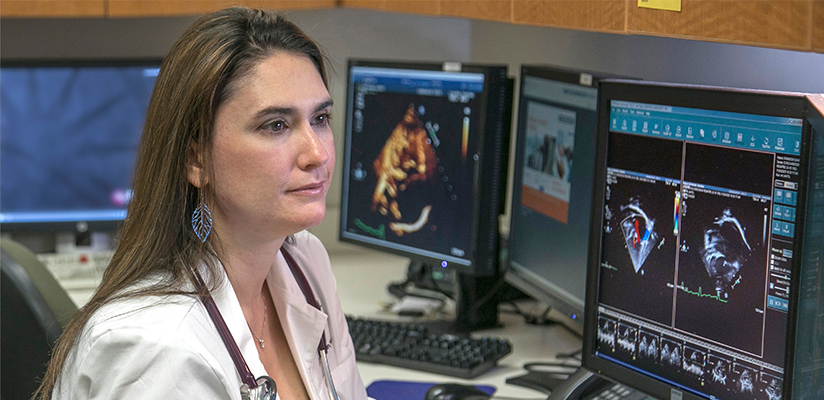Led by Kaitlin Ryan, MD, Le Bonheur’s Pediatric Cardiomyopathy program draws patients from across the country for the diagnosis and management of all types of cardiomyopathy in children, including:
- Dilated cardiomyopathy, a condition in which the heart’s left ventricle becomes enlarged and thinned leading to poor heart function where the heart is unable to pump blood efficiently throughout the body
- Hypertrophic cardiomyopathy, a condition in which the heart muscle thickens (usually the left ventricle), making the left ventricle stiff and making it difficult for blood to flow through the heart
- Restrictive cardiomyopathy, a condition in which the heart muscle becomes stiff and rigid, limiting blood flow in the heart
- Left ventricular non-compaction, a condition that results from a failure of the compaction process (during the heart's development) that is characterized by finger-like heart muscle projections (trabeculations) in the ventricle and can be associated with other forms of cardiomyopathy and congenital heart disease
- Arrhythmogenic right ventricular dysplasia, is characterized by early arrhythmias (irregular heartbeats) and ventricular dysfunction. The right or left ventricle may be affected.
Patients are treated by specially-trained pediatric cardiology specialists at Le Bonheur's Heart Institute, which is nationally recognized by U.S. News & World Report as a top pediatric cardiology program.

Symptoms of Pediatric Cardiomyopathy
Symptoms of pediatric cardiomyopathy depend on the type of cardiomyopathy, and many individuals will not exhibit any symptoms. Others may experience the following:
- Shortness of breath, rapid breathing or trouble breathing
- Dizziness and fainting
- Irregular or fast heart rate
- Abdominal bloating
- Swelling in legs, ankles and feet
- Chest pain
- Extreme fatigue after normal activity
- In infants, trouble feeding and poor weight gain
Cardiomyopathy Treatment Options
We provide a range of cardiomyopathy treatment options and work to provide the best individualized plan of care for your child. Cardiomyopathy treatment options include:
- Drug therapy
- Catheter-based procedures
- Implantation of devices, including Mechanical Circulatory Support (MCS) and Ventricular Assist Device (VAD) in patients with heart failure
- Pacemakers and implantable cardioverter defibrillator (ICD)
- Cardiac ECMO (extracorporeal membrane oxygenation) for patients with heart or respiratory failure
- Cardiovascular surgery, including transplant
We also provide metabolic and genetic screening and testing to determine a patient’s risk of cardiomyopathy and its severity.

Causes of Cardiomyopathy in Children
Cardiomyopathy in children can be caused by a variety of factors, some of which are not fully understood. Some of those causes include:
- Genes inherited through families
- Congenital heart defects
- Myocarditis (inflammation of the heart muscle)
- High blood pressure
- Viral infections
- Chemotherapy treatment
- Conditions outside of the heart such as metabolic, mitochondrial or systemic diseases
- Toxins affecting other organs
The exact cause of cardiomyopathy in children is often unknown.
Cardiomyopathy and Muscular Dystrophy
Le Bonheur Children’s is home to one of the region’s only Muscular Dystrophy Association (MDA) Clinics. Some children with muscular dystrophy develop dilated cardiomyopathy and are at risk of heart failure. In partnership with our MDA Clinic, we offer a full-range of diagnostic and treatment options and management of the cardiac diseases in children with neuromuscular disorders.
Cardiomyopathy and Cancer
We care for all children with cancer-related cardiomyopathy and heart failure, including chemotherapy-induced cardiotoxicity, in partnership with St. Jude Children's Research Hospital.
Cardiomyopathy and Blood Disorders
In partnership with St. Jude Children's Research Hospital, we care for all children with blood disorders who are at risk for cardiomyopathy, including children with sickle cell disease, leukemia and more.




